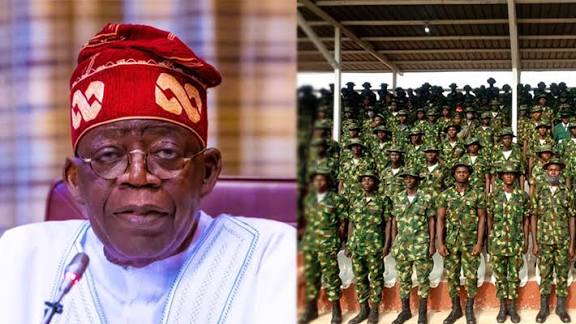
Shockwaves in Aso Rock: Sixteen Senior Military Officers Arrested Over Alleged Coup Plot to Overthrow Tinubu

In a dramatic twist that has sent ripples through Nigeria’s political and military circles, at least sixteen senior officers of the Nigerian Armed Forces have reportedly been arrested by the Defence Intelligence Agency (DIA) over an alleged coup plot aimed at overthrowing President Bola Ahmed Tinubu’s administration. The shocking revelation, which has stirred widespread speculation and concern, comes barely two weeks after the Nigerian military dismissed claims of internal unrest among its ranks.
Sources within the Defence Intelligence confirmed that the arrested officers—ranging from the rank of Captain to Brigadier-General—were rounded up from different parts of the country in what was described as a covert operation to foil an imminent takeover of government. While the Defence Headquarters publicly claimed the arrests were due to “indiscipline and breach of service regulations,” insiders insist the real reason runs much deeper and more alarming: an active plan to seize power from what they described as “selfish politicians.”
In an official statement released by the Director of Defence Information, Brigadier General Tukur Gusau, the military described the arrests as “a routine disciplinary measure” resulting from grievances related to career stagnation and repeated failures in promotion examinations. According to the statement, “the arrested officers were found to have violated service regulations in a manner inconsistent with military discipline.” But behind closed doors, intelligence officials say the situation is far more serious than the military’s sanitized explanation suggests.
A top Defence Intelligence officer who spoke on condition of anonymity revealed that the 16 detained officers had been holding secret meetings, strategizing on how to overthrow the Tinubu administration and install a military government. “They were not just angry about promotions,” the source disclosed. “They had gone beyond complaints. The plan was to eliminate top government officials, including the President, and announce a new military regime. They were already mapping out steps to take over key national installations and communication channels.”
The plot allegedly reached an advanced stage before security operatives intervened. The same source further disclosed that the October 1st Independence Day parade—traditionally held to celebrate Nigeria’s sovereignty—was abruptly cancelled due to credible intelligence of the planned coup. “The parade was called off because of fears that the officers would use it as a cover to execute their plot,” the source said. “They had planned to strike during the parade, targeting the President and other high-ranking politicians in attendance. The National Security Adviser and the Service Chiefs acted quickly by recommending that the event be cancelled to prevent a bloodbath.”
The revelation has sparked intense debate and anxiety across the country, especially given Nigeria’s long and turbulent history with military coups. Since gaining independence in 1960, the nation has witnessed five successful coups and several failed attempts. Many Nigerians had hoped that era was firmly behind them, especially after the country transitioned to democracy in 1999. But this latest development appears to challenge that assumption, exposing once again the undercurrents of dissatisfaction within the military establishment.
Observers say this alleged coup attempt underscores the growing frustration among some officers over issues such as corruption, favoritism, and the politicization of the military hierarchy. Some officers reportedly feel that the government has failed to reward merit and professionalism, leaving competent soldiers sidelined while political connections dictate career advancement. “This sense of injustice is what fuels resentment,” said a retired colonel familiar with the situation. “When officers believe the system no longer values integrity or competence, they start to see themselves as the saviors of the nation—history repeating itself.”
The Defence Headquarters, however, has maintained a calm public posture, emphasizing that the arrests were routine and unrelated to politics. But insiders argue that the military’s cautious communication strategy is designed to prevent panic and preserve public confidence in the system. “They are trying to manage the narrative,” another insider explained. “Announcing that a coup was being planned could trigger fear, affect investor confidence, and damage the government’s credibility. So, they’re playing it down.”
Reactions from Nigerians have been swift and divided. While some citizens expressed alarm at the idea of yet another military intervention, others voiced skepticism, suggesting the alleged coup plot could be exaggerated or politically motivated. On social media, discussions have exploded, with many questioning whether the arrests were a preemptive move to silence dissenting officers who might have criticized the administration.
One user on X (formerly Twitter) wrote, “Every time the government feels threatened, we suddenly hear of a ‘coup plot.’ It’s a convenient excuse to purge the military of those who refuse to play along.” Another countered, “If indeed there was a coup plan, then those behind it must face the full weight of the law. We can’t afford to return to the dark days of military rule.”
Political analysts warn that even if the coup plot was only in its early stages, its exposure could have significant implications for national security and governance. “The very idea that senior officers could contemplate such action reflects deeper discontent in the system,” said security analyst Jide Akanbi. “This is not just about the military—it’s about leadership, fairness, and the fragile balance between power and loyalty.”
The Presidency has not issued a direct statement on the matter as of press time, but sources within Aso Rock indicate that President Tinubu has been briefed on the situation and has ordered an immediate review of security protocols around all top government officials. There are also reports that intelligence agencies have intensified surveillance of military units across the country to forestall any potential backlash or coordinated mutiny.
This development also casts a shadow over the unity of Nigeria’s armed forces at a time when the country faces multiple security challenges—from insurgency in the Northeast to banditry and separatist agitations in other regions. A divided or demoralized military could further weaken national stability, making it imperative for the government to address internal grievances swiftly and transparently.
As investigations continue, questions remain about how far-reaching the alleged plot was and whether more arrests are imminent. For now, the Defence Intelligence Agency is said to be interrogating the detained officers at a secure facility in Abuja. Meanwhile, tension simmers within military circles, as officers fear a broader crackdown or loyalty test.
Nigeria stands once again at a delicate crossroads—caught between the ghosts of its authoritarian past and the promises of democratic endurance. Whether the alleged coup plot was a serious conspiracy or a symptom of deeper institutional rot, one thing is clear: the stability of the nation’s democracy hangs in the balance, and the coming days will determine how firmly that balance is maintained.


